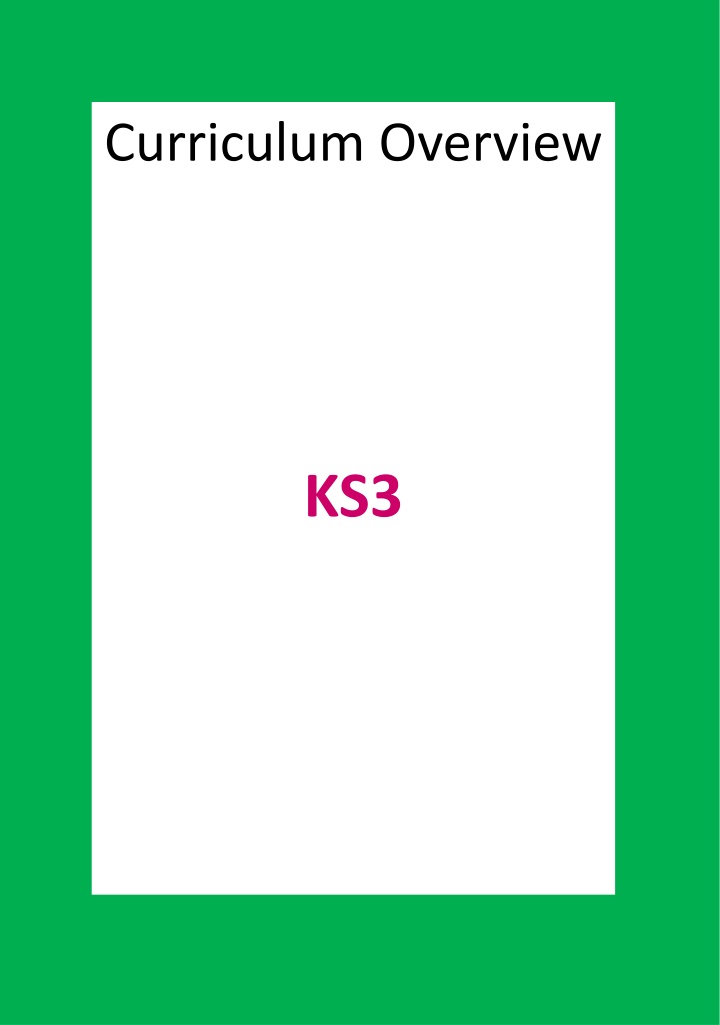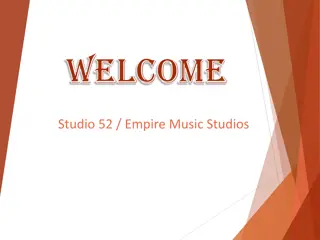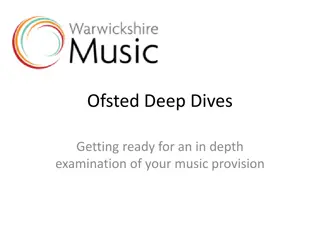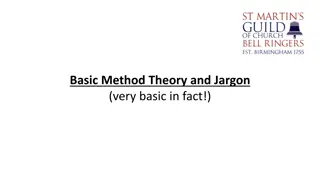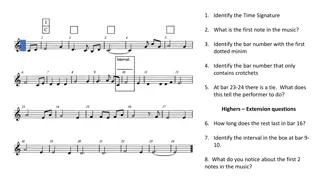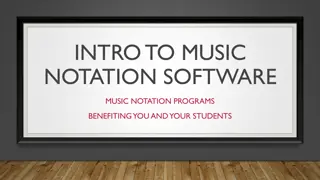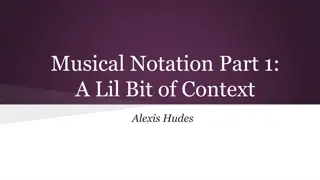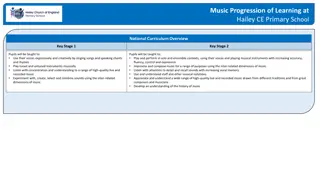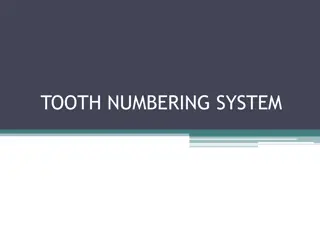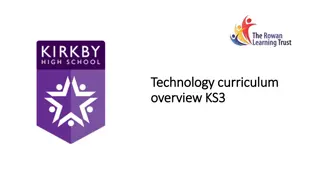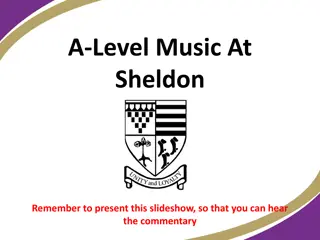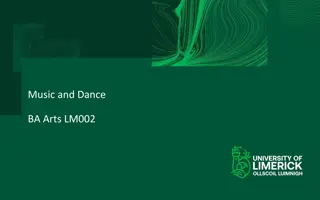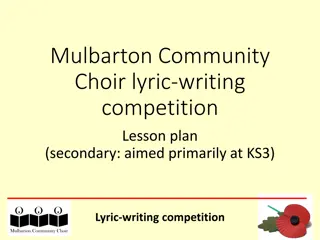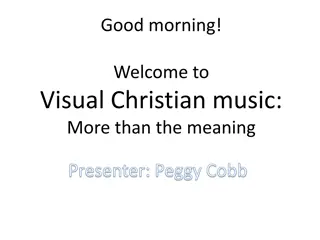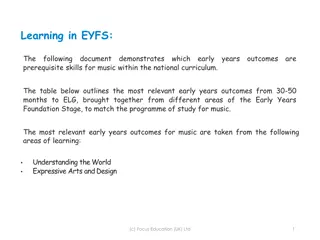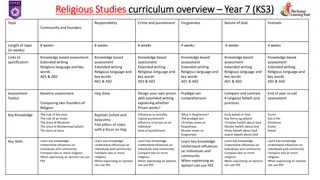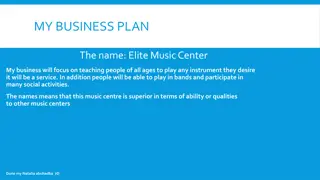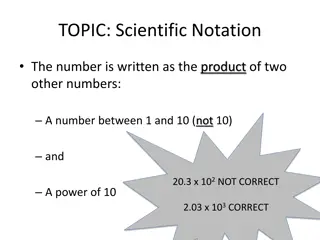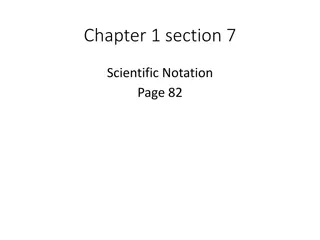Music Notation and Interpretation in KS3 Curriculum
Explore music notation in KS3 Music curriculum, focusing on reading and writing notes from E up to F on the treble clef. Understand various forms of notation such as graphic scores and enhance your musical literacy skills throughout the academic year.
Download Presentation

Please find below an Image/Link to download the presentation.
The content on the website is provided AS IS for your information and personal use only. It may not be sold, licensed, or shared on other websites without obtaining consent from the author.If you encounter any issues during the download, it is possible that the publisher has removed the file from their server.
You are allowed to download the files provided on this website for personal or commercial use, subject to the condition that they are used lawfully. All files are the property of their respective owners.
The content on the website is provided AS IS for your information and personal use only. It may not be sold, licensed, or shared on other websites without obtaining consent from the author.
E N D
Presentation Transcript
Subject: Music Term 1 Term 2 Term 3 Read and write notes from E up to F on the treble clef. Understand that different forms of notation are also used in music such as graphic scores. Read and write notes from E up to F on the treble clef. Read and write notes from E up to F on the treble clef. Year 7 Key concepts /skills Rhythms Minims, crotchets, crotchets rests and joined-quavers. Rhythms - Minims, crotchets, crotchets rests and joined- quavers. Rhythms Crotchets, crotchets rests and joined- quavers. Metre 4/4 , 3/4 Metre 4/4 , 3/4 Elements of Music Students should understand how to identify aurally and use the following elements of music in composition Dynamics, Tempo and Timbre Elements of Music Students should understand how to identify aurally and use the following elements of music in composition Dynamics, Tempo and Timbre Metre 4/4 , 3/4. Elements of Music Students should understand how to identify aurally and use the following elements of music in composition dynamics and tempo. Terminology piano, forte, allegro, andante, largo, crescendo, diminuendo, and ostinato. Terminology piano, forte, allegro, andante, largo, crescendo, diminuendo, and ostinato. Terminology piano, forte, allegro, andante. Instruments Students should be able to recognize aurally the different sections of the orchestra and the main instruments in each. They should be able to play melodies on keyboard and glockenspiel and use a variety of percussion instruments with the correct technique. Play accompaniment parts using the Ukulele. Instruments Students should be able to recognize aurally the different sections of the orchestra and the main instruments in each. They should be able to play melodies on keyboard and glockenspiel. Instruments Students should be able to recognize aurally the different sections of the orchestra and the main instruments in each. They should be able to play melodies on keyboard and glockenspiel and use a variety of percussion instruments with the correct technique. Keyboard Play melodies from Middle C to C above Middle C in the right hand. Use correct hand position and technique. Voice Sing simple melodies and stay in key without accompaniment. Voice Sing simple melodies. Assessmen t Listening Terminology and baseline exam in class Teams Homework Treble Clef and Bass Clef Teams Homework Year 7 End of Year Test, Music Theatre Terminology Teams Homework Treble Clef and Terminology, Beginning Notation, Composition Practical assessment in class Composition Practical assessment in class Composition Practical assessment in class Performance Practical assessment in class Performance Practical assessment in class Performance Practical assessment in class
Subject: Music Two Term Rota Skills Year 8 Key concepts/ skills Notation - Students should be able to read and write notes from G to middle C in the bass clef Rhythms Students should understand how to perform read and dotted notes. They should understand how tied notes work and how to perform these. Understand the feel of rhythms in 3 s. Tala rhythms Indian rhythm cycles Elements of Music Students should understand how to identify aurally and use the following elements of music in composition Texture (homophonic, monophonic, polyphonic). Melody Step and Leap. Terminology Students should understand what the following terminology means and how to apply its use during appreciation mezzo-piano, mezzo-forte, sequence, pentatonic, major, minor, rubato Instruments Students should be able to recognize aurally the instruments of the orchestra. They should be able to play chords on keyboard and ukulele. They should be able to name various non-western instruments and recognize them aurally. Voice Sing in two parts, maintain a harmony line. Concepts Understand how to use different musical techniques to create various moods. Apply the correct techniques to suit the style/genre of music. Be able to keep time in an ensemble while playing complex and syncopated rhythms. Understand how to notate melody and rhythm. Understand how to listen critically to you own music and set areas for improvement. Listening Terminology and baseline exam in class Assessment Teams Homework Treble Clef and Terminology pt.2, The Music of Asia Indian Instruments, The Music of Asia Final Test, Composition Practical assessments in class Performance Practical assessments in class
Subject: Music Two Term Rota Skills Year 9 Key concepts/ skills Notation Students should be able to read bass and treble clef piano notation together. How to read chords and tab notation. Rhythms Students should understand how to read and notate quavers off the beat and quaver rests. They should understand how tied notes work and how to perform these. Elements of Music Students should understand how to identify aurally different use of timbre and techniques used to achieve these such as pizzicato Terminology Students should understand what the following terminology means and how to apply its use during appreciation bpm, distortion, riff, improvisation, tablature Instruments Students should be able to play independent lines on keyboards using two hands. They should be able to play chords and riffs on guitars and recognize these aurally. They should be able to use synthesized instruments and computer- generated sounds in their compositions. Voice Sing whilst also providing accompaniment. Concepts Know how to use stylistically accurate techniques for the style of music you are playing. Make creative decisions based on the mood you are trying to convey in a successful manner. Be able to stay in time within an ensemble maintaining complex rhythms/melodies. Be able to take on various roles in an ensemble performing on more than one instrument successfully. Understand the role technology plays in music making and be able to use software to create your own pieces of music. Listening Terminology and baseline exam in class Assessment Teams Homework Blues Homework 1, Treble and Bass Clef pt.2 Composition Practical assessments in class Performance Practical assessments in class
Subject: Drama Term 1 Project: Physical Theatre and the work of Frantic Assembly Year 8 Key concepts/ skills Skills Terminology - Students should understand and use the following terminology when discussing pieces of Drama - Still image, blocking, stage directions, dramatic tension, improvisation, soundscape, characterisation, status, physical theatre. Physical skills: posture, stance, facial expression, movement, level, eye contact. Vocal skills: volume, projection, pitch, pace, diction. - - Perform students are expected to perform from memory without using a script. They must have a sense of performance and should stay in character throughout a performance. Students will perform characters that they can relate to through personal experience or observation. Students will explore their physicality through performance by becoming objects when studying Physical Theatre. Create students will work in pairs/groups to create their own performances. They will apply key concepts to their work to demonstrate their understanding of theatre and style. Students will work collaboratively throughout the creative process and will evaluate, refine and amend their work before the final performance. Appreciation students will recognise and discuss how the key terminology (above) is implemented in performance to create a character. They will appreciate their own work, their peers work and professional work. Practitioner/Company/Style- Frantic Assembly/Physical theatre. Professional text- The Curious Incident of the Dog in the Night-Time by Mark Haddon. Concepts Understand how status can be shown in different ways and the impact this has on the audience. Understand how physical and vocal skills can be used in Physical Theatre. Stay in character and be fully committed to a performance. How to understand, write and structure a basic script/scene. Be able to critically appreciate your own and others work, using subject terminology to support your points. Performance: Practical assessment in lessons. Assessment Devising: Practical assessment in lessons. Appreciation: Teams homework on terminology and understanding of the style/practitioner being studied.
Subject: Drama Term 1 Project : Naturalism and Stanislavski Year 9 Key concepts/ skills Skills Terminology - Students should understand and use the following terminology when discussing pieces of Drama: - Rehearsal techniques, role-play, hot seating, thought-tracking, role on the wall, subtext, naturalism, fourth wall, magic if, given circumstances, objectives. Physical skills: pace, gait, gesture, body tension, spatial relationships. Vocal skills: accent, pause, tone, emphasis, inflection. - - Perform students are expected to perform an extract from a set text from memory without using a script. They should follow stage directions clearly and interpret the text to create an engaging performance. They should use their contextual understanding of the play and apply Stanislavski s methods to their rehearsals to develop their character. They should apply the physical and vocal skills they have developed to create a believable character and must stay focused throughout a performance. They should consider how to apply their physical and vocal skills appropriately to the naturalistic style of theatre being performed. Create students will work in pairs/groups to create their own performance inspired by a stimulus. Their work will be informed and inspired by the text they study. They will apply Stanislavski s methods to their work to embody the style of theatre correctly. They will work collaboratively and will develop organisational and time management skills throughout the creative process. Appreciation - students will recognise and discuss how the key terminology (above) is implemented in performance and the effect this has on an audience. They will appreciate their own work, their peers work and professional work. Practitioner/Company/Style- Stanislavski/Naturalism. Professional text- DNA by Dennis Kelly. Concepts Be able to identify and apply dramatic conventions correctly according to the theatrical style in performance and creative work. Understand how to create a character/scene from a set text and the impact this has on the audience. Be able to stay in role for a whole performance displaying a range of emotions. Know how to create a piece of drama inspired by a stimulus. Critically appreciate your own work and the work of others using subject terminology to support your points. Performance: Practical assessment in lessons. Assessment Devising: Practical assessment in lessons. Appreciation: Teams homework on terminology and understanding of the style/practitioner being studied.
Subject: Maths NOTE: These are not exhaustive lists Term 1 Term 2 Term 3 Year 7 Key concepts/skills Find/use primes/squares/roots, multiples, factors; order/calculate fractions, decimals, %, negatives; identify shape properties; simplify by collecting terms, expanding brackets; substitution; express/calculate using ratio. Working with sequences (primarily term-to-term); Measure angles/lengths; convert units; find area; apply angle rules to find missing angles; solve linear equations Plot points; transform shapes by reflection, rotation, translation; tabulate data; plot bar, pie, line charts; calculate averages and range; work with simple probabilities (equally likely outcomes) Assessment 1 x 45 mins, assessing mainly first half term 1 x 45 mins, assessing mainly first term 2 x 45 mins, assessing mainly first two terms Year 8 Key concepts/skills Find HCF, LCM; write in standard form; substitute into expressions, etc including indices/roots; expand brackets and factorise expressions; re-arrange formulae; enlarge shapes; 2D representation of 3D; bearings; sample space, relative frequency Further fraction/decimal/% conversion (including looking at recurring); further ratio including multiplicative relationships; speed/distance/time; find/using nth term of linear sequences; angles in parallel lines; exterior/interior angles of polygons Calculate % changes; solve linear equations/inequalities; find area/circumference of circles; sketch graphs; find gradients/intercepts from graphs; construct histograms and scatter Assessment 1 x 45 mins, assessing mainly first half term 1 x 45 mins, assessing mainly first term 2 x 45 mins, assessing mainly first two terms Year 9 Key concepts/skills Standard form (inc. calculation); bounds; loci & construction; product of bino; factorising quadratics; direct/inverse proportion; congruence & similarity; Fibonacci & quadratic sequences; solving inequalities & showing on number lines; area/vol of sectors/cylinders; Pythag. Theorem Finding equation of straight line; plot quadratic, cubic, reciprocal; solve linear simultaneous equations; tree diagram probability; time series graphs; using scatter diagrams Assessment 1 x 45 mins, assessing mainly first half term 1 x 45 mins, assessing mainly secon d half term 2 x 45 mins, assessing first two terms
Subject: English NOTE: These are not exhaustive lists Term 1 Term 2 Term 3 Year 7 Key concepts/skills Key question: How do writers craft their language for different audiences and purposes? Reading focus: Private Peaceful by Michael Morpurgo Writing Focus: Powerful Words: Persuasive writing stimulus Key question: How do writers of different text types structure their work for most impact? Reading focus: The Jungle Book by Rudyard Kipling Writing Focus: Imaginary Worlds: Creative writing and animal poetry stimulus Key question: How do writers respond to the social issues of their day? Reading focus: A Midsummer Night's Dream by William Shakespeare Writing Focus: Points of View: Inform writing stimulus Reading and Writing assessments held in class. I hour each. Reading and Reading assessment held in exam hall. Writing assessment held in class. I hour each. Assessment Writing assessments held in class. I hour each. Year 8 Key concepts/skills Key question: How do writers construct and then develop their characters ? Reading focus: Oliver Twist by Charles Dickens Writing Focus: Points of View: Informative writing article Key question: How do writers craft their language and structure their texts to engage the reader? Reading focus: The Tempest by William Shakespeare Writing Focus: Powerful Words: Writing to argue Key question: How and why do writers adopt different genres in their texts? Reading focus: Uncle Montague's Tales of Terror by Chris Priestley Writing Focus: Imaginary Worlds: Creative writing on the gothic Reading and Writing assessments held in class. I hour each. Reading and Reading assessment held in exam hall. Writing assessment held in class. I hour each. Assessment Writing assessments held in class. I hour each. Year 9 Key concepts/skills Key question: How do writers use different voices and points of view in their texts to aid meaning? Reading focus: Of Mice and Men by John Steinbeck Writing Focus: Powerful Words: Writing to persuade Key question: How do writers reflect a social zeitgeist? Reading focus: A selection of conflict poetry Writing Focus: Imaginary Worlds: Descriptive writing: focused on creating character and setting Key question: How do playwrights utilise the dramatic form? Reading focus: Romeo and Juliet by William Shakespeare Writing Focus: Powerful Words: Writing to argue Reading and Writing assessments held in class. I hour each. Reading and Reading assessment held in exam hall. Writing assessment held in class. I hour each. Assessment Writing assessments held in class. I hour each.
Subject: Religious Education Term 1 Term 2 Term 3 Year 7 Key concepts School community Hierarchy of the Church Sacraments Rites of Initiation Using the Bible Miracles of Jesus Was Jesus human? Nativity Jesus in Art Forgiveness Prodigal Son Reconciliation Forms of punishment Lent What do Jewish people believe? Abraham and Moses Torah Kosher Jewish Festivals Skills AO1: Knowledge and understanding AO2: Analysis and evaluation Assessment Assessment based on Unit 1: Belonging Assessment held in-class, 45 minutes Teacher assessed Assessment based on Unit 2: Identity of Jesus Assessment held in-class, 45 minutes Teacher assessed Interleaved assessment covering the first three Units Completed in exam hall 45 minutes Teacher assessed Year 8 Key concepts Rite of Confirmation Pentecost and Holy Spirit Gifts of the Holy Spirit Religious orders and vocation Cost of discipleship Jesus treatment of: Other cultures The elderly and disabled Women Events of Holy Week Significance of Holy Week Significance of the Eucharist Different Christian attitudes to the Eucharist What do Muslims believe? Muhammad (PBUH) Five Pillars of Islam Qur an and Hadith Role of Women Jihad Skills AO1: Knowledge and understanding AO2: Analysis and evaluation Assessment Assessment based on Unit 1: Confirmation Assessment held in-class, 45 minutes Teacher assessed Assessment based on Unit 2: Jesus and Others, Eucharist Assessment held in-class, 45 minutes Teacher assessed Interleaved assessment covering the first three Units Completed in exam hall 45 minutes Teacher assessed Year 9 Key concepts Life as a journey Lourdes Hajj Jerusalem Views on creation Design and causation Sanctity of life Abortion Body and soul Human trafficking Euthanasia The Commandments The meaning of life Religious views on marriage and family Problem of evil Christian responses to suffering Joseph and Job Christian response to suffering Skills AO1: Knowledge and understanding AO2: Analysis and evaluation Assessment Assessment based on Unit 1: Pilgrimage Assessment held in-class, 45 minutes Teacher assessed Assessment based on Un it 2: Creation Assessment held in- class, 45 minutes Teacher assessed Interleaved assessment covering the first three Units Completed in exam hall 45 minutes Teacher assessed
Subject: Science Term 1 Term 2 Term 3 Year 7 Key concepts/skills Materials and their uses and atoms. Organisation. Forces. Cells. Energy. AO1: knowledge and understanding. AO2: Apply knowledge and understanding. AO3: Analyse information and draw valid conclusions. Particles and matter. Reproduction and variation. Chemical reactions. Elements, compounds and mixtures. Assessment In-class assessment 45 minutes Assesses topics covered to date. In-class assessment 45 minutes Assesses topics covered to date. In-class assessment 45 minutes Assesses topics covered to date. Year 8 Key concepts/skills Energy. Reproduction. Chemical reactions. Respiration and exercise. Solutions. Wave properties. AO1: knowledge and understanding. AO2: Apply knowledge and understanding. AO3: Analyse information and draw valid conclusions. Acids and alkalis. Electricity and magnetism. Plants, animals, and food chains. Assessment In-class assessment 45 minutes Assesses topics covered to date. In-class assessment 45 minutes Assesses topics covered to date. In-class assessment 45 minutes Assesses topics covered to date. Year 9 Key concepts/skills The human body. Health and disease. GCSE ready a review of key concepts and knowledge from Key Stage 3. Acids and alkalis. The reactivity series. AO1: knowledge and understanding. AO2: Apply knowledge and understanding. AO3: Analyse information and draw valid conclusions. Further forces and motion. Light and the eye. Genetics & variation. Elements and the Periodic Table. Energy Assessment In-class assessment 45 minutes Assesses topics covered to date. In-class assessment 45 minutes Assesses topics covered to date. In-class assessment 45 minutes Assesses topics covered to date.
Subject: French Term 1 Term 2 Term 3 Talking about likes and dislikes Describing yourself Talking about other people Talking about school subjects Describing your school day Talking about technology Talking about which sports you play Describing what you like doing Talking about your town or village and what you can do Giving directions Talking about holidays Talking about getting ready to go out Buying drinks and snacks Saying what you would like to do Year 7 Key concepts/skills In class assessment speaking one to one with teacher based on the areas above. 3-5 mins per student In class reading and translation assessment 45 mins In class listening and writing assessment 45 mins Assessment Talking about TV programmes, films, reading and the internet Saying what you did last night Saying what you did in Paris Asking questions in the perfect tense Talking about personality and relationships Talking about music and clothes Describing where you live and your home Talking about an event Using the present, past and future tenses Talking about talent and ambition Encouraging and persuading someone Saying who is the best, the most, the least Talking about French speaking countries and the importance of 14th July. Year 8 Key concepts/skills In class assessment speaking one to one with teacher based on the areas above. 3-5 mins per student In class reading and translation assessment 45 mins In class listening and writing assessment 45 mins Assessment Talking about Facebook Using present tense verbs Giving your opinion about someone Talking about sport and healthy living and eating Describing jobs Saying what you used to do Using all four tenses together Discussing holidays Discussing what you are allowed to do Explaining what is important to you Using si in complex sentences Year 9 Key concepts/skills In class assessment speaking one to one with teacher based on the areas above. 3-5 mins per student In class reading and translation assessment 45 mins In class listening and writing assessment 45 mins Assessment
Subject: Art Term 1 Term 2 Term 3 Year 7 Key concepts/skills Drawing and sculpture Formal elements Emphasis on observational drawing techniques as well as sculptural outcome 3D Painting Delaunay Emphasis on colour theory and painting Textiles Pattern Emphasis on print making, textile techniques and surface design) A01: Develop AO2: Explore A03: Record AO4: Present Assessment In-class assessment 45 minutes In-class assessment 45 minutes In-class assessment 45 minutes Year 8 Key Concepts/skills Drawing and printmaking Animals Emphasis on observational drawing and print making techniques Textiles: Culture Emphasis on textile construction and print making techniques Sculpture, drawing and painting Sweets & treats Emphasis on sculpture/ ceramics pinch pot techniques A01: Develop AO2: Explore A03: Record AO4: Present Assessment In-class assessment 45 minutes In-class assessment 45 minutes In-class assessment 45 minutes Year 9 Key Concepts/skills Textiles Fashion Environmental project) Emphasis on design development and surface design Drawing & painting and relief sculpture Term 2:1 - Portraiture Term 2:2 - Architecture Drawing & painting GCSE ready Pupils independently select a concept/ area to develop: Portraiture Food Animals & nature A01: Develop AO2: Explore A03: Record AO4: Present Assessment In-class assessment 45 minutes In-class assessment 45 minutes In-class assessment 45 minutes
Subject: Spanish Term 1 Term 2 Term 3 Describing places and location Saying what someone is like Saying what people have Saying what people do Numbers (1 to 12) and talking about more than one thing Saying what there is around you and describing it Talking about the location of things Describing activities Describing actions Describing how people use technology Discussing what people do and don t do Describing people and possessions Describing when and where people go Describing future plans Describing family Asking questions Talking about what you do with others Talking about what people can do Contrasting what people must, can and want to do Places and locations Year 7 Key concepts Speaking Task Writing Task Assessment Translation Task Past travel Comparing past experiences Talking about what people and places are like now vs in general. Comparing what you and someone else ( we ) do Describing home life What people can / must do Describing events in the past and present (at school) Describing events in the past and present (free time) Describing how people feel in the present (feelings/emotions) Talking about people s work Speaking Task Describing what people do (technology) Past free time activities Routines and daily life Describing a series of events (narration) Talking about giving and receiving (Birthdays) Describing how things make people feel Giving opinions about school Visiting a Spanish speaking city Describing family Describing feelings Comparing things Sports Comparing where people go and went Asking questions about what people did Learning about a famous Spanish speaking person Describing school Talking about past and future trips Year 8 Key concepts Reading/Listening Task Writing Task Assessment Describing events in the past (holidays) Asking questions about holidays Describing the location of things Talking about routine events Describing people, places and traditions in Mexico Talking about food Going on a school trip Talking about sport and exercise Talking about health Describing people and what they do (an evening at home) Talking about Christmas traditions Describing what you did and what you do Describing a charity event The conquest of Peru Migration and the lives of Spanish speakers in the US Talking about climate change Describing a past school event Talking about what you have to do Talking about making a film Describing events in the past Reporting the news Reading/Listening Task Describing routines and events in the past Hearing a well-known story in Spanish Don Quijote Giving advice and instructions Talking about the environment Talking about a family gathering Describing a street market Talking about possessions Describing a trip to a film festival Talking about holiday plans Year 9 Key concepts Speaking Task Writing Task Assessment
Subject: Geography Term 1 Term 2 Term 3 Topic 1. Becoming a Geographer Enquiry question: What is my place in the world? Scale: International, national, local. Skills: Map skills, description. Topic 3: A Tourist's world Enquiry question: Why is tourism important? Place: South America and Oceania. Skills: Decision making and justification. Year 7 Key concepts Topic 2: Frozen Oceans Enquiry question: Why do the frozen oceans need preserving ? Place:Arctic/Antarctic/Oc ean biomes. Skills: Key chain explanations, analysing figures. In class assessment Written assessment In class assessment Written assessment Assessment In class assessment Written assessment Topic 1: The Climate Crisis Enquiry question: Are we heading for a climate catastrophe? Place: Africa Skills: Analysing figures Topic 2: Mind the Gap: Development and Globalisation. Enquiry question: Why is global development so uneven? Place: Asia, Africa Skills: Analysing figures Topic 3:Water on the land Enquiry question: How does water shape the land? Place: UK Skills: OS maps, GIS and fieldwork. Year 8 Key concepts In class assessment Written assessment In class assessment Written assessment In class assessment Written assessment Assessment Topic 1: Dynamic Planet Enquiry question: Why is Planet Earth so hazardous? Place: Caribbean. Skills: Key chain explanations, analysing figures Topic 2: Natural Resources Enquiry question: Why are resources so important? Place: Russia and Middle East Skills: Analysing figures Topic 3: People on the Move: population. Enquiry question: Why is the world's population always on the move? Place: Mediterranean migration Skills: Description, OS maps, GIS and fieldwork. Year 9 Key concepts In class assessment Written assessment In class assessment Written assessment In class assessment Written assessment Assessment
Subject: PE Term 1 Term 2 Term 3 -Boys: -Baseline Assessment/ Basketball/ Rugby Union/ X- Country/ Football/ T-Tennis Girls: Baseline Assessment/ Netball/ Dance/ X-Country/ Rugby/ Basketball Boys Tennis/ Athletics/ Cricket Girls Tennis/ Athletics/ Rounders Year 7 Key concepts Boys: Sports Leadership/ Badminton/ Orienteering/ Handball Girls: Trampolining/ Gymnastics/ Orienteering/ Handball Skill Focus: -Refine techniques to improve performance. -Lead healthy and active lives. Skill Focus: -Taking part in outdoor and adventurous activities. -Developing a range of leadership skills. Skills Focus: -Range of tactics and strategies to overcome opponents in competitive situations. -Analyse performance and suggest methods of performance. In the final lesson of each activity block. Please note, no formal written exam will occur. Due to the practical nature of the activity. In the final lesson of each activity block. Please note, no formal written exam will occur. Due to the practical nature of the activity. In the final lesson of each activity block. Please note, no formal written exam will occur. Due to the practical nature of the activity. Assessment Boys Basketball/ X-Country/ Football/ Rugby/ Girls Netball/ Dance/ X-Country/ Rugby/ Badminton. Boys Handball/ Badminton/ T- Tennis/ Orienteering Girls T-Tennis/ Football/ Trampolining/ Handball Boys Tennis/ Athletics/ Cricket Girls Tennis/ Athletics/ Rounders Year 8 Key concepts Skill Focus: -Refine techniques to improve performance. -Lead healthy and active lives. Skills Focus: -Range of tactics and strategies to overcome opponents in competitive situations. Skill Focus: -Taking part in outdoor and adventurous activities. -Developing a range of leadership skills. In the final lesson of each activity block. In the final lesson of each activity block. In the final lesson of each activity block. Assessment Boys Football/ Rugby/ Basketball/ X- Country/ Girls Netball/ Dance/ Rugby/ Badminton Boys Handball/ Badminton/ T- Tennis/ Orienteering Girls T-Tennis/ Football/ Trampolining/ Handball/ Orienteering Boys Tennis/ Athletics/ Cricket Girls Tennis/ Athletics/ Rounders Year 9 Key concepts Skill Focus: -Refine techniques to improve performance. -Lead healthy and active lives. Skills Focus: -Analyse performance and suggest methods of performance. Skill Focus: -Taking part in outdoor and adventurous activities. -Developing a range of leadership skills. In the final lesson of each activity block. In the final lesson of each activity block. In the final lesson of each activity block. Assessment
Subject: IT Term 1 Term 2 Term 3 School Email skills Organising files and folders Hardware Components Year 7 Key concepts & Skills Using the Internet Safety The Internet Basic Office Applications Programming Essentials Data Handling Assessment In-class assessment 45 minutes In-class assessment 45 minutes In-class assessment 45 minutes Assesses topics covered to date. Assesses topics covered to date. Assesses topics covered to date. Text based Programming with Python Binary Create, reuse, revise and repurpose digital artefacts Year 8 Key Concepts & Skills Vector Graphics Data Representation Assessment In-class assessment 45 minutes Assesses topics covered to date. In-class assessment 45 minutes In-class assessment 45 minutes Assesses topics covered to date. Assesses topics covered to date. Data Science 3D Modelling Text based Programming with Python Year 9 Key Concepts & Skills Web design Digital Graphics HTML, CSS & Javascript Assessment In-class assessment 45 minutes In-class assessment 45 minutes In-class assessment 45 minutes Assesses topics covered to date . Assesses topics covered to date. Assesses topics covered to date.
Subject: Engineering Engineering Rotation All terms Year 7 Key concepts/skills A01: Forces and structures How do forces act upon engineered products? (Aerodynamics in F1 design and stress loads in structures). Y7 skills: Data driven testing for helicopters, aeroplanes and F1 STEM project. Design development. Team work in bridges an F1 project. Assessment In class assessment 45mins Year 8 Key concepts/skills A01:Mechanisms and Hydraulics How are assembly and disassembly processes carried out? How do mechanisms work? What is a hydraulic system? Y8 Skills: Mechanical fasteners within the lamp project. Assembly and disassembly within the lamp project. Hydraulic systems. Assessment In class assessment 45mins Year 9 Key concepts/skills A01: Computer Aided Design and Rapid Prototyping (3D Printing How is modern manufacturing evolving to accommodate new additive manufacturing processes? How can computer simulated designs aid the design development process? Y9 Skills: CAD command tools Slicing for 3D printing 3D printing Prototyping concept designs. Assessment In class assessment 45mins
Subject: History Term 1 Term 2 Term 3 The Reformation: Why did the Reformation happen? What impact did the Reformation have on the North East? Pre-1066: To what extent was Athelstan the first King of the English ? Year 7 Key concepts Medieval Kingdoms: How similar were Medieval kingdoms in England, Africa and Asia? Writing like a Historian Cause and consequence Similarities and Differences Norman Invasion: Why was there a succession crisis in 1066? How did the Normans change England? The Mongol Empire: How did Genghis Khan build his Empire? How important was the Mongol Empire? In-class assessment including extended writing and a knowledge quiz In-class assessment including extended writing and a knowledge quiz Assessment In-class assessment including extended writing and a knowledge quiz The British Empire: How and why did Britain create an empire? How did the slave trade reshape the world? Was India treated like the jewel in the crown ? The Industrial Revolution: What changed during the Industrial Revolution? How revolutionary was the 19th century? World War One How did the experience of empire troops differ from British troops? Death, defeat, mud and misery How accurate is this interpretation? Year 8 Key Concepts Using Historical sources Significance Change and continuity World War One: Why did the world go to war in 1914? Migration in the UK: How significant has migration been in the formation of Britain? In-class assessment including extended writing and a knowledge quiz In-class assessment including source analysis task and knowledge quiz In-class assessment including analysis of a historical interpretation and knowledge quiz Assessment Nazi Germany and World War Two: How did the Nazi s control Germany? What was the key turning point of World War Two? The Holocaust What was life like for Jewish people before Nazi Germany? Why did the Holocaust happen? The Cold War and Vietnam Why did East beat West in Vietnam? Year 9 Key Concepts 20th Century Civil Rights How similar were the campaigns for civil rights in South Africa, India and the USA? Analysing Historical interpretations Change and continuity Significance Cause and consequence The Cold War and Vietnam Why did the Iron Curtain fall? What was the Red Scare ? In- class assessment including extende d writing and a knowledge quiz In- class assessment including extended writing and a knowledge quiz In-class assessment including analysis of a historical interpretation and knowledge quiz Assessment
Subject: Design and Technology Term 1/Term2/Term 3 (Rotation) Key Skills A01: Identify tools and machines in the workshop and the relevant health and safety regulations for their correct use. A02: Resistant materials (wood work). PCB population (soldering and circuit work). A03: The research and evaluation of commercial products. Year 7 Key concepts/skills How do designers use resistant materials and electronic devices in the design of a product? How to use simple manufacturing skills to produce working prototypes. Content Identify tools and machines in the workshop and the relevant health and safety regulations for their correct use. Be able to explain how a product is designed and manufactured to meet a required need. Assessment Term 1, 2 &3: Written Test - K&U 45 mins and Design Task in Class How do designers use modern and traditional materials to produce everyday products? How do we ensure we are meeting user needs and wants? How can we use the work of others to help our own design decisions? A01: Identify tools and machines in the workshop and the relevant health and safety regulations for their correct use. Year 8 Key concepts/skills A02: Properties of modern and traditional materials A03: Sustainability and Environmental Impact of products on society Content Be able to explain and analyse how a product is designed and manufactured to meet a required need. Recall how modern and traditional materials are used to enhance everyday products. How to effectively communicate design intentions through formal and non-formal drawings. Assessment Term 1, 2 &3: Design and Analysis Task - K&U 45 mins A01: Identify tools and machines in the workshop and the relevant health and safety regulations for their correct use. Year 9 Key concepts/skills How do designers and engineers use Computer Aided Manufacture in the design and manufacturing of a product? A03: CAM used in commercial manufacturing and laser cutting/engraving school project. A01: Research task using ACCESS FM as a product research tool. Assessment Term 1, 2 &3: Formal drawing Task (Isometric and Orthographic Drawings) including ACCESSFM Analysis - K&U 45 mins A02: Design task using technical drawing processes to design a product. A03: Exam paper on ACCESSFM
Subject: Food and Nutrition Term 1/Term2/Term 3 (Rotation) Key Skills Can you follow health and safety guidelines to work independently and effectively in the food classroom? A01: Identify basic equipment used in the practical environment. Work safely, efficiently and independently to create a quality food product. Year 7 Key concepts/skills A02: Complete a practical task independently in one hour. Why does our body need nutrients? A03: Health and nutrition knowledge, health and safety and identifying equipment and ingredients How can bacteria contaminate food? Term 1, 2 &3: 45 minute in class assessment Complete a practical task in one hour. Pupils will be assessed on health and safety as well as quality of the final product. Assessment Can you identify the difference between fats and sugars? A01: Independently create a successful product within one hour. Year 8 Key concepts/skills Can you explain the effects of deficiency and excess? A02:Explain the link between a range of nutrients and health A03: Identify and explain the function of a range of ingredients when cooking Assessment Term 1, 2 &3: 45 minute in class assessment Complete a practical task in one hour. Pupils will be assessed on key skills including kneading, rolling and shaping a dough, how effectively they use equipment and the quality of their product. Can you identify and explain the effects of a poor diet? A01: Adapt and develop a recipe to produce a healthier alternative to a traditional sponge cake. Year 9 Key concepts/skills Why are vitamins and minerals vital for good health? A02: Complete a complex practical task in one hour. A03: Health and nutrition knowledge, macro and micro nutrients. The effect of diet on our health How are raising agents used in cooking? Assessment Term 1, 2 &3: 45 minute in class assessment Complete a practical task in one hour. Pupils will be assessed on their ability to work independently and adapt a recipe.
Subject: Y10 GCSE Music Y10 Term 1 Term 2 Term 3 Year 10 Key concepts /skills Skills: Skills: Skills: Treble and Bass Clef Use Noteflight Software Write for drums Instrumental and Rehearsal Technique Set text to music Write for Bass Understand the pitch range of various instruments Write for Guitar Main musical terminology Use chord progressions in compositions Vocal Music associated terminology Instrumental music terminology Concepts: Concepts: Concepts: Understand the structure of the course Compose in various styles and understand the main features of different styles Self assess and set appropriate targets for development Understanding Component 1: Solo performance grading criteria Understand how different musical elements can be used to create a mood or fit a musical intention Understand Sonata form Understand key features of Musical Theatre Understanding Component 2:Composition grading criteria Understand how to use the grading criteria to set areas of improvement for solo performance Knowledge of musical elements Understand how to analyse two of the set works Instrumental music analysis Assessment Teams : Notes of the clef homework testing treble and bass, terminology Teams : Notes of the clef homework testing treble and bass Listening : Mock appraising exam Composition: Comp 1 assessment 1 Listening : Mock appraising exam Teams : Terminology Solo Performance : Students perform and record a piece of music lasting at least one minute
Subject: Y11 GCSE Music Y10 Term 1 Term 2 Term 3 Year 11 Key concepts /skills Skills: Practice as part of an ensemble Skills: Know all terminology for each style of music studied Skills: Write for drums Write for Bass Record final free composition Recognise a variety of instruments and know their key qualities Write for Guitar Revise year one appraisal material Use chord progressions in compositions Identify aurally musical terminology from each area of study. Use correct music terminology depending on the style/genre of music Concepts: Self assess and set appropriate targets for development Concepts: Understand how exam technique can help create success and apply techniques you have been taught Identify styles of music based on instruments and characteristics Understand Sonata form Concepts: Identify gaps in knowledge and address these Understand key features of Musical Theatre Understand the differences and similarities of the Set Works. Understand how to achieve marks in the higher grade boundaries Understand the difference between a musical performance and technically accurate one Understand how to compose to a set brief Understand how music for Stage and Screen is written and idioms used. Understand context of Set Works and unheard pieces Understand where your strengths and weaknesses are and make the correct choices for composition and performance based on these. Assessment Composition : Comp 1 assessment 2 Listening: Mock exam Composition: Final assessment Composition: Comp 2 Assessment 1 Final Solo Performance : Students perform and record their final solo performance Listening: Final exam Ensemble Performance : Students perform and record their final ensemble performance Listening: Mock exam
Subject: Y10 GCSE Drama Term 1 Term 2 Term 3 Year 10 Key concepts /skills Skills Understand and be able to use in practice: Stage positioning (upstage, downstage, and centre stage) Stage configurations Role and responsibilities of theatre makers. Skills Design fundamentals such as scale, shape, colour, and texture The design of props and the design of sets such as revolves, trucks, projection, multimedia, pyrotechnics, smoke machines, and flying The design of costume, including hair and make-up The design of lighting such as direction, colour, intensity, special effects Skills Understand and be able to use in practise: Research techniques Development of ideas Language and structure in scriptwriting Apply stylistic features of a practitioner to their own work Rehearse, refine and amend their work in progress Analyse and evaluate their own process of creating devised drama Concepts Drama and theatre terminology and how to use it appropriately The roles and responsibilities of theatre makers in contemporary professional practice Knowledge and understanding of how drama and theatre is developed and performed. The design of sound such as direction, amplification, music, sound effects both live, and recorded Understanding the social, cultural and historical context in which the performance texts studied are set and using this to discuss and create. Understanding the theatrical conventions of the period in which the performance texts studied were created and being able to discuss and use this information to inform their own decisions. Concepts Social, cultural and historical contexts. How meaning is interpreted and communicated. Concepts Create and communicate meaning Realise artistic intention in devised drama. Assessment Performance: Ensemble performance of devised piece. Performance: Monologue and duologue/ensemble performances of Blood Brothers. Performance: Formative assessment of Component 2 devised piece. Devised: Practice log book of devised piece. Devised: Formative assessment of devised performance and draft log books section A and B. Appreciation: Written assessments of dramatic terminology and Section A. Appreciation: Written assessments of dramatic terminology and Section A. Appreciation: Component 1 mock exam of Sections A and B.
Subject: Y11 GCSE Drama Term 1 Term 2 Term 3 Year 11 Key concepts /skills Skills Understand and be able to use in practice: Skills Understand the following and know how to use/discuss in creation and appreciation: Genre Structure Character Form Style Language Sub-text Character motivation and interaction The creation of mood and atmosphere The development of pace and rhythm Dramatic climax Stage directions The practical demands of the text Concepts Characteristics of performance texts and dramatic work Skills Know the meaning of all Drama terminology and apply to written work. Be able to put into practice the skills taught throughout the course. Concepts Know which revision techniques work best for the individual and create a revision plan based on this Have a solid plan and technique for sitting the final exam. Knowledge and understanding of how drama and theatre is developed and performed, including in connection to a set play and on their ability to analyse and evaluate the live theatre work of others. Performance conventions Use of performance space and spatial relationships Actor and audience configuration Relationships between performers and audience Performers' vocal interpretation of character such as accent, volume, pitch, timing, pace, intonation, phrasing, emotional range, delivery of lines Performers' physical interpretation of character such as build, age, height, facial features, movement, posture, gesture, facial expression Concepts How meaning is interpreted and communicated. Assessment Performance: Recorded performance of component 2 devised piece for external assessment. Performance: Component 3 performance for external assessment. Appreciation: Component 1 summer examination. Devised: Summative assessment of component 2 log book. Appreciation: Component 1 mock exam.
Subject: Religious Education Term 1 Term 2 Term 3 Year 10 Key concepts What do Jewish people believe? Nature of G-d and Nature of Messiah Abraham and Moses Importance of Mitzvot Sanctity of Life and Pikuach Nefesh Life and Death How do Jewish people practice their beliefs? Tenakh and Talmud Synagogue Worship at home Shabbat Rites of passage Festivals Where do we come from? Different views of creation Sanctity of life Abortion Different views on abortion Stewardship Catholic Social Teaching Skills AO1: Knowledge and understanding AO2: Analysis and evaluation Assessment Assessment based on Judaism: Beliefs and Teachings Assessment held in-class, 45 minutes Teacher assessed Assessment based on Judaism: Practices Assessment held in-class, 45 minutes Teacher assessed Assessment based on Judaism: Beliefs and Teachings, Practices Assessment held in exam hall, 1 hour Teacher assessed Year 11 Key concepts What is good and evil? Problem of evil Catholic views on evil Trinity and Incarnation Moral sources of authority Statues and the rosary Pilgrimage What is the afterlife? The afterlife The soul Magisterium Sarcophagi and the Paschal candle Funeral rite What is right and wrong? Sin and crime Forms of punishment Christian teachings on forgiveness Salvation and redemption Sacraments Church and church Evangelisation Skills AO1: Knowledge and understanding AO2: Analysis and evaluation Assessment Assessment based on FCT: Origins and Meaning Assessment held in-class, 45 minutes Teacher assessed Assessment based on FCT: Origins and Meaning, Good and Evil Assessment held in exam hall, 1 hour 30 minutes Teacher assessed Formal examinations: Paper One- Foundational Catholic Theology- 1 hour 30 minutes Paper Two- Applied Catholic Theology- 1 hour 30 minutes Paper Three- Judaism- 1 hour
Subject: English Term 1 Term 2 Term 3 Year 10 Key concepts/skills Key question: Why do writers choose to make their texts ambiguous and what impact does this have on readers/ audiences? Key question: How do writers use their texts to protest against social issues? Key question: How does conflict shape each of the texts we have studied? Literature focus: A Christmas Carol by Charles Dickens Literature focus: Macbeth by William Shakespeare Literature focus: An Inspector Calls by J.B. Priestley A selection of Power and Conflict poetry AQA A Christmas Carol by Charles Dickens Language focus: Language Paper 1 Q5: creative writing A selection of Power and Conflict poetry, plus unseen poetry analysis Power and Conflict poetry revision Revising An Inspector Calls and A Christmas Carol Language focus: Language Paper 2 Q5: creative writing Revising An Inspector Calls Language focus: Language Paper 1 Q5: creative writing Assessment Reading Assessment: An Inspector Calls. In class 50 minutes. Ongoing poetry assessed writing tasks in class. Reading Assessment: A Christmas Carol In class 50 minutes. Ongoing poetry and creative writing assessed tasks in class. Reading Assessment: Macbeth In exam hall 50 minutes. Assessed writing of unseen poetry in class. Year 11 Key concepts/skills Key question: How can we borrow language and structural features from literary texts and use these in our own writing? Key question: How do writers present and control different points of view to impact upon readers? Key question: How do we revise best in English? Literature focus: Macbeth by William Shakespeare Revising An Inspector Calls and Power and Conflict poetry Language focus: Language Paper 1 Literature focus: Revision of each major text, prioritisingA Christmas Carol first Language focus: Language Paper 2 Literature focus: Revision of each major text Language focus: Language Papers 1 and 2 Assessment Reading and Writing Assessment: Macbeth/unseen poetry preliminary assessment Reading and Writing Asse ssment: Reading and Writing Asse ssment: Full mock exams: Literature Paper 2 and Language Paper 2 held in exam hall. Formal external exams begin in May 2023 Full mock exams: Literature Paper 1 and Language Paper 1 held in exam hall.
Subject: Combined Biology Term 1 Term 2 Term 3 Year 10 Key concepts/skills How are organisms structured from the smallest to largest units? How do pathogens affect living organisms and how do they defend against them? How do cellular chemical reactions provide cells with energy? AO1: Demonstrate knowledge and understanding of scientific ideas. AO2: Apply knowledge and understanding of scientific ideas. AO3: Analyse information and draw conclusions to improve experimental procedures AO1: Demonstrate knowledge and understanding of scientific ideas. AO2: Apply knowledge and understanding of scientific ideas. AO3: Analyse information and draw conclusions to improve experimental pro cedures AO1: Demonstrate knowledge and understanding of scientific ideas. AO2: Apply knowledge and understanding of scientific ideas. AO3: Analyse information and draw conclusions to improve experimental proc edures Assessment Assessment held in class 45 minutes Teacher assessed Assessment held in class 45 minutes Teacher assessed Assessment held in exam hall 1 hour 15 minutes Teacher assessed Year 11 Key concepts/skills How do plants and animals maintain a constant internal environment? How does inheritance occur? How do living organisms survive and interact with each other in an ecosystem? AO1: Demonstrate knowledge and understanding of scientific ideas. AO2: Apply knowledge and understanding of scientific ideas. AO3: Analyse information and draw conclusions to improve experimental proc edures AO1: Demonstrate knowledge and understanding of scientific ideas. AO2: Apply knowledge and understanding of scientific ideas. AO3: Analyse information and draw conclusions to improve experimental pr ocedures AO1: Demonstrate knowledge and understanding of scientific ideas. AO2: Apply knowledge and understanding of scientific ideas. AO3: Analyse information and draw conclusions to improve experimental pro cedures Assessment Assessment held in class 45 minutes Teacher assessed Assessment held in exam hall 1 hour 15 minutes Teacher assessed Assessment held in class 45 minutes Teacher assessed
Subject: GCSE Triple Biology Term 1 Term 2 Term 3 Year 10 Key concepts/skills How are organisms structured from the smallest to largest units? How do pathogens affect living organisms and how do they defend against them? How do cellular chemical reactions provide cells with energy? AO1: Demonstrate knowledge and understanding of scientific ideas. AO2: Apply knowledge and understanding of scientific ideas. AO3: Analyse information and draw conclusions to improve experimental procedures AO1: Demonstrate knowledge and understanding of scientific ideas. AO2: Apply knowledge and understanding of scientific ideas. AO3: Analyse information and draw conclusions to improve experimental pr ocedures AO1: Demonstrate knowledge and understanding of scientific ideas. AO2: Apply knowledge and understanding of scientific ideas. AO3: Analyse information and draw conclusions to improve experimental pr ocedures Assessment Assessment held in class 45 minutes Teacher assessed Assessment held in class 45 minutes Teacher assessed Assessment held in exam hall 1 hour 45 minutes Teacher assessed Year 11 Key concepts/skills How do plants and animals maintain a constant internal environment? How does inheritance occur? How do living organisms survive and interact with each other in an ecosystem? AO1: Demonstrate knowledge and understanding of scientific ideas. AO2: Apply knowledge and understanding of scientific ideas. AO3: Analyse information and draw conclusions to improve experimental pr ocedures AO1: Demonstrate knowledge and understanding of scientific ideas. AO2: Apply knowledge and understanding of scientific ideas. AO3: Analyse information and draw conclusions to improve experimental pr ocedures AO1: Demonstrate knowledge and understanding of scientific ideas. AO2: Apply knowledge and understanding of scientific ideas. AO3: Analyse information and draw conclusions to improve experimental pr ocedures Assessment Assessment held in class 45 minutes Teacher assessed Assessment held in exam hall 1 hour 45 minutes Teacher assessed Assessment held in class 45 minutes Teacher assessed
Subject: Combined Chemistry Term 1 Term 2 Term 3 Year 10 Key concepts/skills What are atoms and what happens when they react? How do acids behave and what do they react with? How can we separate out compounds and measure the energy changes of reactions? AO1: Demonstrate knowledge and understanding of scientific ideas. AO2: Apply knowledge and understanding of scientific ideas. AO3: Analyse information and draw conclusions to improve experimental procedures AO1:Demonstrate Knowledge and understand ing of scientific ideas. AO2: Apply knowledge and understanding of scientific ideas. AO3: Analyse information and draw conclusions to improve experimental proc edures AO1:Demonstrate knowle dge and understanding of scientific ideas. AO2: Apply knowledge and understanding of scientific ideas. AO3: Analyse information and draw conclusions to improve experimental pro cedures Assessment Assessment held in class 45 minutes Teacher assessed Assessment held in class 45 minutes Teacher assessed Assessment held in exam hall 1 hour 15 minutes Teacher assessed Year 11 Key concepts/skills How can we separate out compounds and measure the rate of a reaction? How can we identify different substances? How can we obtain safe drinkable water? AO1: Demonstrate know ledge and understanding of scientific ideas. AO2: Apply knowledge and understanding of scientific ideas. AO3: Analyse informatio n and draw conclusions to improve experimental procedures AO1: Demonstrate knowle dge and understanding of scientific ideas. AO2: Apply knowledge and understanding of scientific ideas. AO3: Analyse information and draw conclusions to improve experimental proc edures AO1:Demonstrate knowle dge and understanding of scientific ideas. AO2: Apply knowledge and understanding of scientific ideas. AO3: Analyse information and draw conclusions to improve experimental pro cedures Assessment Assessment held in class 45 minutes Teacher assessed Assessment held in exam hall 1 hour 15 minutes Teacher assessed Assessment held in class 45 minutes Teacher assessed
Subject: GCSE Triple Chemistry Term 1 Term 2 Term 3 Year 10 Key concepts/skills What are atoms and what happens when they react? How do acids behave and what do they react with? How can we separate out compounds and measure the energy changes of reactions? AO1: Demonstrate knowledge and understanding of scientific ideas. AO2: Apply knowledge and understanding of scientific ideas. AO3: Analyse information and draw conclusions to improve experimental procedures AO1:Demonstrate Knowledge and understand ing of scientific ideas. AO2: Apply knowledge and understanding of scientific ideas. AO3: Analyse information and draw conclusions to improve experimental proc edures AO1:Demonstrate knowle dge and understanding of scientific ideas. AO2: Apply knowledge and understanding of scientific ideas. AO3: Analyse information and draw conclusions to improve experimental pro cedures Assessment Assessment held in class 45 minutes Teacher assessed Assessment held in class 45 minutes Teacher assessed Assessment held in exam hall 1 hour 15 minutes Teacher assessed Year 11 Key concepts/skills How can we separate out compounds and measure the rate of a reaction? How can we identify different substances? How can we obtain safe drinkable water? AO1: Demonstrate know ledge and understanding of scientific ideas. AO2: Apply knowledge and understanding of scientific ideas. AO3: Analyse informatio n and draw conclusions to improve experimental procedures AO1: Demonstrate knowle dge and understanding of scientific ideas. AO2: Apply knowledge and understanding of scientific ideas. AO3: Analyse information and draw conclusions to improve experimental proc edures AO1:Demonstrate knowle dge and understanding of scientific ideas. AO2: Apply knowledge and understanding of scientific ideas. AO3: Analyse information and draw conclusions to improve experimental pro cedures Assessment Assessment held in class 45 minutes Teacher assessed Assessment held in exam hall 1 hour 15 minutes Teacher assessed Assessment held in class 45 minutes Teacher assessed
Subject: Combined Science: Physics Term 1 Term 2 Term 3 Year 10 Key concepts/skills Energy and the uses of energy. How are electrical circuits constructed. The particle arrangement in solids, liquids, and gases and how this gives substances their properties. Calculating different energy types. The difference between series and parallel circuits and the advantages and disadvantages of both. AO1: Recall knowledge and understanding. AO2: Apply knowledge and understanding. AO3: Analyse information and draw valid conclusions. How heat travels through solids and why we insulate our homes. How the atom has evolved over time with new discoveries. How specialised components are used in lighting and heating. Different methods for energy generation and the impact of this on the environment. The structure, properties, uses and dangers of radiation. How electricity used safely in the home. Assessment In-class assessment 45 minutes Teacher assessed In-class assessment 45 minutes Teacher assessed Mock assessment 1 hour 15 minutes Teacher assessed Year 11 Key concepts/skills Forces and how they interact. Force and acceleration. Wave properties continued. Newton s 2nd law. Calculating resultant forces and their effect. The uses and dangers of the electromagnetic spectrum. AO1: Recall knowledge and understanding. AO2: Apply knowledge and understanding. AO3: Analyse information and draw valid conclusions. Force and elasticity and Hooke s law. Forces and motion, including speed, velocity and acceleration. Wave properties. Magnetic fields and electromagnetic induction. Assessment In-class assessment 45 minutes Teacher assessed In-class assessment 45 minutes Teacher assessed Mock assessment 1 hour 15 minutes Teacher assessed
Subject: GCSE Triple Physics Term 1 Term 2 Term 3 Year 10 Key concepts/skills Energy and the uses of energy. How are electrical circuits constructed. The particle arrangement in solids, liquids, and gases and how this gives substances their properties. Calculating different energy types. The difference between series and parallel circuits and the advantages and disadvantages of both. AO1: Recall knowledge and understanding. AO2: Apply knowledge and understanding. AO3: Analyse information and draw valid conclusions. How heat travels through solids and why we insulate our homes. Gas pressure and temperature. How specialised components are used in lighting and heating. How the atom has evolved over time with new discoveries. Different methods for energy generation and the impact of this on the environment. Static electricity. The structure, properties, uses and dangers of radiation. How electricity used safely in the home. Nuclear fission and fusion and how a nuclear fission reactor works. Assessment In-class assessment 45 minutes Teacher assessed In-class assessment 45 minutes Teacher assessed Mock assessment 1 hour 45 minutes Teacher assessed Year 11 Key concepts/skills Forces and how they interact. Wave properties. Magnetic fields and electromagnets. Sound. Calculating resultant forces and their effect. The motor effect and generator effect and their applications. The use of waves for exploration. AO1: Recall knowledge and understanding. AO2: Apply knowledge and understanding. AO3: Analyse information and draw valid conclusions. Forces and motion, including speed, velocity and acceleration. The uses and dangers of the electromagnetic spectrum. Transformers, linked to the National Grid. Force and acceleration. Our Solar System. The applications of light and the formation of real and virtual images. Newton s 2nd law. The life cycle of a star. Force and elasticity and Hooke s law. The origins of the Universe. Force and pressure. Assessment In-class assessment 45 minutes Teacher assessed In-class assessment 45 minutes Teacher assessed Mock assessment 1 hour 45 minutes Teacher assessed
Subject: Health and Social Care Term 1 Term 2 Term 3 Types of services. Functions of HSC services. Job roles within HSC. Referrals to HSC. Barriers to accessing services. Formal care. Informal care. Role of regulatory bodies. Ofsted. Explained and unexplained life events. Year 10 Key concepts/skills Nature/nurture argum ent for development. Care Quality Commission The role of care planning in meeting needs of individuals . Care needs throughout life stages. Who can care for people and who regulates the carers? What is the health and social care sector? Stages of development from conception to birth. What are the key influences on human development? Key milestones of development throughoutthe life stages . How do humans grow and develop through the life stages? Assessment 45 minute test on term 1 material P1,P2,P3,P4,P5, M1,M2,M3 coursework tasks for UNIT 1 45 minute test on term 1 and 2 material P6,P7, D1, D2 coursework tasks for UNIT 1 90 minute exam on everything from terms 1,2 and 3 Coursework tsks P1,P2, P3, P4,P5, P6, P7, M1, M2, M3, D1, D2 for UNIT 3 Legislation. Professional skills. HSC values. Person- centred practice. Partnership working. Barriers to partnership working . Career development. Careers advice. Qualifications and training. Legislation. Professional skills. HSC values. Person-centredpractice. Partnership working. Barriers to partnership workin g. Career development. Careers advice. Qualifications and training. REVISION: Year 11 Key concepts/skills TAHSC1 TAHSC2 TAHSC 3 What are the responsibilities of HSC workers? What are the responsibilities of HSC workers? Assessment 90 minute mock exam on everything from Year 10 and Year 11 so far EXTERNAL EXAM IN FEBUARY Coursework RESIT OPPORTUNITY FOR EXTERNAL EXAM
Subject: Maths (Foundation) Term 1 Term 2 Term 3 Integers and place value Decimals Indices and standard form Factors, multiples, primes The basics of algebra Expressions and substitution into formulae Tables, charts and graphs Pie charts Fractions, decimals and percentages Equations and inequalities Ratio Percentages Sequences Properties of shapes, parallel lines and angle facts Transformations Statistics, sampling and the averages Perimeter, area and volume Real life graphs Straight line graphs Interior, exterior angles of polygons Year 10 Key concepts/skills Assessment 1 x 45 mark paper covering content so far (non-calculator) 2 x 45 mark papers covering content so far (paper 1 calculator and paper 2 non-calculator) 2 x 45 mark papers covering content so far (paper 1 calculator and paper 2 non-calculator) Scatter graphs Proportion Right angled triangles: Pythagoras and trigonometry Probability Multiplicative reasoning Plans and elevations Constructions, loci and bearings Quadratic equations: expanding and factorising Quadratic equations: graphs Circles, cylinders, cones and spheres Fractions and reciprocals Similarity and congruence in 2D Vectors Rearranging equations, graphs of cubic and reciprocal functions and simultaneous equations Year 11 Key concepts/skills This term will be used for revision. Assessment 2 x 45 mark papers covering content so far (paper 1 calculator and paper 2 non-calculator) 3 x 65 mark papers for mock covering content so far (paper 1 and 3 calculator, paper 2 non- calculator) GCSE exams 3 x 65 mark papers for mock covering content so far (paper 1 and 3 calculator, paper 2 non- calculator)
Subject: Maths (Higher) Term 1 Term 2 Term 3 Perimeter, area and circles 3D forms and volume, cylinders, cones and spheres Accuracy and bounds Transformations Constructions, loci and bearings Solving quadratics and simultaneous equations Inequalities Year 10 Key concepts/skills Calculations, checking and rounding Indices, roots, reciprocals and hierarchy of operations Factors, multiples, primes, standard form and surds Algebra basics, setting up, rearranging and solving equations Sequences Averages and range Representing and interpreting data and scatter graphs Fractions and percentages Ratio and proportion Polygons, angles and parallel lines Pythagoras and trigonometry Graphs: the basics and real life graphs Linear graphs and coordinate geometry Quadratic, cubic and other graphs 2 x 45 mark papers covering content so far (paper 1 calculator and paper 2 non- calculator) 2 x 45 mark papers covering content so far (paper 1 calculator and paper 2 non- calculator) Assessment 1 x 45 mark paper covering content so far (non-calculator) Probability Multiplicative reasoning: direct and inverse proportion, compound measures Similarity and congruence in 2D and 3D Further trigonometry Cumulative frequency, box plots and histograms Circle theorems Changing the subject, algebraic f ractions, rationalising s urds, proof Vectors and geometric proof Quadratics: double brackets, sketching graphs Direct and inverse proportion Circle geometry Reciprocal and exponential: gradient and area under curve Graphs of trig functions Collecting data Year 11 Key concepts/skills This term will be used for revision 2 x 45 mark papers covering content so far (paper 1 calculator and paper 2 non- calculator) Assessment 3 x 65 mark papers for mock cov ering content so far (pape r 1 and 3 calculator, paper 2 non-calculator) GCSE exams 3 x 65 mark papers for mock covering content so far (paper 1 and 3 calculator, paper 2 non- calculator)
Subject: Business Term 1 Term 2 Term 3 Year 10 Key concepts/skills What is enterprise and entrepreneurship? How can we make a business effective? How can an entrepreneur grow their business? How is a business opportunity spotted? How can we understand the external influences that impact a business? How can an entrepreneur finance their business? How do we put a business idea into practice? AO1 Knowledge AO2 Application AO3 Analysis AO1 Knowledge AO2 Application AO3 Analysis AO1 Knowledge AO2 Application AO3 Analysis Numeracy skills and data analysis Numeracy skills and data analysis Numeracy skills and data analysis Assessment In Class 1 Hour In Class 1 Hour In Class 1.5 Hours Covering Theme 1.1, 1.2 and 1.3 Covering Theme 1.4, 1.5 Covering Theme 1 Year 11 Key concepts/skills How can an entrepreneur grow their business? What operational decisions need to be made? What human resource decisions need to be made? What marketing decisions need to be made? What financial decisions need to be made? AO1 Knowledge AO2 Application AO3 Analysis AO1 Knowledge AO2 Application AO3 Analysis AO1 Knowledge AO2 Application AO3 Analysis Numeracy skills and data analysis Numeracy skills and data analysis Numeracy skills and data analysis Assessment In Class 1 Hour Exam Hall Two 1 hour papers In class 1 hour Covering Theme 1 (Yr10 Material) Theme 2.1 and 2.2 Combination of Theme 1 and Theme 2 content Paper 1 Theme 1 (Yr 10 Material) Paper 2 2.1, 2.2, 2.3
Subject: Geography Term 1 Term 2 Term 3 Year 10 Key concepts/ skills Component 1 Topic 2: Development Dynamics Topic 3: Challenges of an urbanising world. Topic 1: Hazardous Earth Component 1/2 Topic 1: Hazardous Earth Topic 2: The UK Evolving Physical Landscape Topic 3: Coastal Landscape and Change Component 2 Topic 3: River Processes and Pressures Physical Fieldwork AO1/AO2 Key Questions -What is the scale of global inequality and how can it be reduced? -How is India, one of the world s emerging countries, managing to develop? -What are the causes and challenges of rapid urban change? -Why does quality of life vary so much within Mumbai? -How does the world s climate system function, why does it change and how can this be hazardous for people? Key Questions -How are extreme weather events increasingly hazardous for people? -Why do the causes and impacts of tectonic activity and management of tectonic hazards vary with location? -Why does the physical landscape of the UK vary from place to place? -Why is there a variety of distinctive coastal landscapes in the UK and what are the processes that shape them? -What are the challenges for coastal landscapes and communities and why is there conflict about how to manage them? Key Questions -Why is there a variety of river landscapes in the UK and what are the processes that shape them? -What are the challenges for river landscapes, people and property and how can they be managed? -How do river characteristics change flood risk along the Wear Assessment 45 minute in class assessment 45 minute in class assessment 1hr 30 mins in exam hall Year 11 Key Concepts/ skills Component 2: Topic 5: Geographical Investigations Human Fieldwork -Topic 4: The UK s Evolving Human Landscape Key Questions: How and why does quality of life vary within Newcastle? Why are places and people changing in the UK? How is London, a major UK city, changing? Component 3 Topic 1: People and the Biosphere Topic 2: Forests Under Threat Topic 3: Consuming Energy Resources Key Questions: Why is the biosphere so important to human wellbeing and how do humans use and modify it to obtain resources? What are the threats to forest biomes and how can they be reduced? Component 3 Making a Geographical Decision Key Question: How do you make a geographical decision? AO1/AO2/ AO3/AO4 *Revision of Components 1-3 Assessment 45 minute in class assessment 1hr 30 mins assessment in exam hall. 45 minute in class assessment
Subject: Art Term 1 Term 2 Term 3 Year 10 Key concepts/ skills Drawing & painting Organic/ natural form skills building Ceramics - sculpture Organic/ natural form Drawing and mixed media Unit 1: Fantastic & Strange OR Geometric form (year 11 coursework) A01: Develop AO2: Explore A03: Record AO4: Present Observational drawing from primary and secondary sources. Own photography developing skills with light. Presentation skills Charcoal drawings Oil pastel enlargements Pen and wash Watercolour Design development Ceramics (pinch pot) Ceramics (slab or coil building) Working in the style of an artist Colour mixing Compositional theory Ceramic techniques (coil building, slab building and pinch pots) Painting/glazing Observational drawing from primary and secondary sources. Own photography developing skills with light. Working in the style of an artist Colour mixing Compositional theory Mixed media Oil painting Dry point etching Compositional theory Grid method Digital editing Assessment 45 minute in class assessment 45 minute in class assessment 45 minute in class assessment Year 11 Key Concepts/ skills Drawing, 2D, 3D and mixed media Fantastic & Strange/ geometric form (year 11 coursework) Drawing, 2D, 3D and mixed media Externally Set Assignment January 2022 (Year 11 Exam) Externally Set Assignment January 2022 A01: Develop AO2: Explore A03: Record AO4: Present Assessment 45 minute in class assessment Practical exam - 10 hours Moderation to take place Mock exam (timings TBC)
Subject: Textiles Term 1 Term 2 Term 3 Year 10 Key concepts/ skills Drawing & Textile techniques Organic/ natural form skills building Textiles Cushion Organic/ natural form Drawing and Textiles Unit 1: Oceans and Sustainability OR Beauty of Decay OR Futuristic (year 11 coursework) A01: Develop AO2: Explore A03: Record AO4: Present Observational drawing from primary and secondary sources. Own photography developing skills with light. Presentation skills Pencil drawings Pen and wash Watercolour Sewing machine skills Applique Reverse applique Machine embroidery Hand embroidery Working in the style of an artist Colour mixing Tie-Dye Design development Pattern development Construction skills Observational drawing from primary and secondary sources. Own photography developing skills with light. Working in the style of an artist Colour mixing Compositional theory Printmaking Fabric manipulation Digital editing Assessment 45 minute in class assessment 45 minute in class assessment Year 11 Key Concepts/ skills Drawing and Textiles (year 11 coursework) Drawing and Textiles Externally Set Assignment January 2023 (Year 11 Exam) GCSE examination begin A01: Develop AO2: Explore A03: Record AO4: Present Assessment 45 minute in class assessment Practical exam 10 hours
Subject: Engineering Term 1 Term 2 Term 3 What are the links between the various engineering sectors and the role of design in the production of engineered products? How can we use Computer Aided Design to solve an engineering problem? How can we investigate and create solutions to problems in response to given engineering briefs? Year 10 Key concepts/skills Learning Aim A: Understand engineering sectors, products and organisations, and how they interrelate. Learning aim B: Explore engineering skills through the design process. AO1 Understand how to respond to an engineering brief AO2 Select skills and techniques in response to an engineering brief. A1 Engineering sectors, engineered products and interconnections. B1 The design process A2 Engineering organisations, functions, job roles and career progression. Assessment C1A1 Internal Assessment Assignment Brief C1 A2 Internal Assessment Assignment Brief A01/A02 Mock Exam paper What are common Materials, Components and Processes used in engineered products? What are the planning, making, testing and evaluating processes needed to manufacture an engineered product. How can we investigate and create solutions to problems in response to given engineering briefs? Year 11 Key concepts/skills Learning Aim A: Understand materials, components and processes for a given engineered product. A1: Materials A2: Components A3: Processes A03: Apply skills and techniques in response to an engineering brief. Learning Aim C: Plan the manufacture and safely reproduce, inspect, test a given engineered component. C1: Engineering make process. C2: Develop a production plan. A04: Evaluate and review the outcomes of the application of skills and techniques in response to an engineering brief. Learning Aim B: Investigate a given engineered product using disassembly techniques. B1: Practical engineering skills. B2: Disassembly techniques. B3: Product Design Specification (PDS). Assessment C2A1/A2 Internal Assessment Assignment Brief C2A3 Internal Assessment Assignment Brief A01/A04 Mock Exam Paper
Subject: Spanish Term 1 Term 2 Term 3 Say where you went in the summer Say what holiday activities you did Describe your holiday accommodation Describing daily routine Describing mealtimes Giving food preferences Ordering in a restaurant Describing illnesses and Injuries Asking for help in a pharmacy Comparing different festivals Describing a special day Talking about going to music festivals Talking about places in town and shops Shopping describing features of a region Stating future plans in my region Giving the pros and cons of the city Describe a visit in the past Year 10 Key concepts Describe any problems with reservations Discuss free time activities past/present Justify sport/music preferences Describe role models Discuss Christmas traditions In class Writing Paper Assessment Talking about jobs and workplaces Discussing job preferences Saying how you earn money Talking about what you spend it on Discussing work experience Applying for jobs The importance of languages in the workplace Future plans Post 16 In class Reading and Listening Assessment Talking about healthy diets and lifestyle Discussing diet related problems Evaluating the effects of bad habits on health Assessment In class Speaking Assessment Talking about global problems and solutions Discussing environmental issues Stating preferences re volunteering Discussion of international sporting events to raise awareness Year 11 Key concepts Reading and Listening Papers Listening/Reading/ Speaking/Writing Papers Assessment Speaking Mock
Subject: French Term 1 Term 2 Term 3 Talking about getting on with others Describing family and friends Talking about future relationships Discussing future relationship choices Talking about the uses of social media Discussing the pros and cons of social media Discussing the uses of mobile technology Grasping the present and future tenses of regular and irregular verbs Describing my home and my ideal home Describing what a town is like and what there is to see and do Describing a region Describing charity work Understanding the importance of charities Comparing old and new health habits Describing health resolutions Discussing environmental problems and their solutions Discussing global issues, inequality and poverty in the world Describing free time activities in the past Talking about leisure activities Talking about different cuisines and eating out Discussing world food and eating habits Talking about sports and taking risks in sports Talking about celebrations Discussing what traditions mean to you and describing and event Year 10 Key concepts In class Reading and Listening Assessment In class Writing Paper Assessment Assessment In class Speaking Assessment Talking about holiday preferences Describing holidays in detail Talking about visiting different places in France Talking about visiting French towns and cities Describing a day in school Describing school life in different countries Talking about school rules and uniform Talking about your ideal school Talking about future options, university and apprenticeships and how to get a job Revision of Themes 1- 3 Past Paper Practice Year 11 Key concepts Reading and Listening Papers Listening/Reading/ Speaking/Writing Papers Assessment Speaking Mock
Subject: History Term 1 Term 2 Term 3 Medicine Through Time (Paper 1). Ideas on the causes of illness and treatments Including: How has understanding of disease and illness changed over time? How similar were the Black Death of 1347 and the Great Plague of 1665? Nazi Germany (Paper 3) 1933-1939 Including: How did Hitler become Fuhrer? What was the Police State? How were women and young people treated under Nazi rule? What happened to minority groups like the Jews? Year 10 Key concepts Medicine Through Time (Paper 1). Prevention of illness and the WW1 battlefield medicine case study Including: Why did Medicine move forward in the 19th and 20th century? What injuries did soldiers sustain in World War One? How were soldiers treated in World War One? Nazi Germany (Paper 3) 1919-1933 Including: How was Germany punished after World War One? Why did the German people begin to vote for Hitler? In-class assessment including 16 marker and knowledge quiz Full mock exam including Paper and part of Paper 3 Assessment In-class assessment including full Paper 1 Anglo-Saxons and Normans (Paper 2). Including: Why was there a succession crisis in 1066? What happened at the battle of Hastings? How did the Normans control England? How did the Anglo-Saxons fight back? American West (Paper 2). Including: What was unique about Native Americans and their way of life? Why did Americans settle the West? How lawless was the West? How did the Americans defeat the Native Indian tribes? Revision of all units Year 11 Key concepts Full mock exam including paper 3 Assessment In-class assessment including all units
Subject: BTEC DIGITAL IT Term 1 Term 2 Term 3 Component 1: Exploring User Interface Design Principles and Project Planning Techniques Learners will develop their understanding of what makes an effective user interface and how to effectively manage a project. They will use this understanding to plan, design and create a user interface. Component 1 Non-Examined Assessment Window Year 10 Key concepts Component 2: Collecting, Presenting and Interpreting Data Learners will understand the characteristics of data and information and how they help organisations in decision making. They will use data manipulation methods to create a dashboard to present and draw conclusions from information. Non-exam internal assessment set by Pearson, marked by the centre and moderated by Exam Board. The Board-set Assignment will be completed in approximately 6 hours of supervised assessment. 60 marks. Component 2: Collecting, Presenting and Interpreting Data Learners will understand the characteristics of data and information and how they help organisations in decision making. They will use data manipulation methods to create a dashboard to present and draw conclusions from information. Assessment Component 2 Non-Examined Assessment Window Year 11 Key Concepts Component 3: Effective Digital Working Practices Learners will explore how organisations use digital systems and the wider implications associated with their use. Non-exam internal assessment set by Pearson, marked by the centre and moderated by Exam Board. The Board-set Assignment will be completed in approximately 6 hours of supervised assessment. 60 marks. Assessment External assessment set and marked by Exam Board, completed under supervised conditions. The assessment will be completed in 1 hour 30 minutes. 60 marks
Subject: Computer Science Term 1 Term 2 Term 3 Computer systems 1.1 Systems architecture 1.2 Memory and storage 1.3 Computer networks, connections and protocols Programming Skills Computer systems 1.6 Ethical, legal, cultural and environmental impacts of digital technology Programming Skills Year 10 Key concepts Computer systems 1.4 Network security 1.5 Systems software Programming Skills End of Topic Assessments Covering all Content Covered so far End of Topic Assessments Covering all Content Covered so far Assessment End of Topic Assessments Covering all Content Covered so far Computer systems Revision Computational thinking, algorithms and programming Revision Programming Skills Computational thinking, algorithms and programming 2.1 Algorithms 2.2 Programming fundamentals Programming Skills Computational thinking, algorithms and programming 2.3 Producing robust program 2.4 Boolean logic 2.5 Programming languages and Integrated Development Environments Programming Skills Year 11 Key concepts Terminal Exams Computer systems (01) 80 marks 1 hr 30 mins Computational thinking, algorithms and programming (02) 80 marks 1 hr 30 mins Calculators not allowed End of Topic Assessments Covering all Content Covered so far Assessment End of Topic Assessments Covering all Content Covered so far
Subject: Design and Technology Term 1 Term 2 Term 3 Year 10 Key concepts/skills Key question: What technical principles are used when designing everyday products? Key question: Key question: Coursework from June 1st When working with timber and board, what specialist materials and processes are used? Key Knowledge: new and emerging technologies energy generation and storage developments in new materials systems approach to designing Key Knowledge: Use learned 2D and 3D design skills to design a fully functional working design proposal to meet you own specification. Key Knowledge: mechanical devices materials and their working properties. selection of materials or components forces and stresses ecological and social footprint sources and origins using and working with materials stock forms, types and sizes scales of production specialist techniques and processes surface treatments and finishes To use learned knowledge of materials and processes to show technical designs to meet user group needs. Assessment Progress Test Range of methodologies covered in specialist Technical principles Progress Test All Topics covered so far. Progress Test Common examination questions used on all topics. Year 11 Key concepts/skills Key question: COURSEWORK: How do we ensure a product is fit for purpose? Key question: How have designers past and present used their influence to inspire others within the field of design. Key question: How to ensure coursework is completed to the required standard. Key Knowledge: Includes the following areas: investigation, primary and secondary data environmental, social and economic challenge the work of others design strategies communication of design ideas prototype development selection of materials and components tolerances material management specialist tools and Exam Preparation Key Knowledge: Students should investigate, analyse and evaluate the work of past and present designers and companies to inform their own designing. Key Knowledge: Revision of all Theory Content and Completion of Practical outcomes and development of evaluative skills. This investigation should be included within their coursework.
Subject: Construction Term 1 Term 2 Term 3 Year 10 Key concepts/skills Key question: What are the range of tools and equipment used within the construction industry. Key question: How are different joints in timber used to construct simple frames. Key question: How do I answer long and shorter type questions in my externally assessed unit. How are buildings constructed to meet user requirements. How to record progress in the workshop focussing on H&S as well as Quality Control and accuracy. Key Knowledge: Pupils show an understanding of Tools, Equipment, Materials focusing on their storage and use. Key Knowledge: Foundations, Wall and floor construction. Types of roof and insulation. Key Knowledge: Understand how to use key knowledge to support answers in the externally assessed unit. Pupils gain an understanding of how low-rise buildings are constructed. How to use tools during carpentry activities. Health and Safety in the Workshop. Assessment Assessment: Unit 1 Construction Technology Assignment A Unit 5 Carpentry Assignment A Assessment: Unit 1 Construction Technology Assignment B Unit 5 Carpentry Assignment B Assessment: Unit 1 Assignment B Unit 5 Assignment B Continued . Year 11 Key concepts/skills Key question: How to design a sustainable building to meet a client s needs. Key question: How do we use mathematical skills to calculate building costs. How to use 3D Perspective drawings to present our ideas. Key question: How to format presentation drawings to a client. How to use basic mathematical skills to solve Construction tasks. Key Knowledge: Using CAD software to develop presentation drawings. Key Knowledge: Key Knowledge: Sustainable construction techniques for low rise buildings. Calculating Building costs using surface area. Analysing own designs against client briefs. Thermal Expansion Hooke Law, Young Modulus Assessment Assessment: Unit 3 Maths and Science in Construction Assignment A Unit 2 Construction & Design Assignment A Assessment: Assessment: Unit 2 Assignment B Unit 3 Assignment B Unit 3 Maths and Science in Construction Assignment B Unit 2 Construction & Design Assignment B Completion of course
Subject: Food and Nutrition Term 1 Term 2 Term 3 What are the wider factors which influence food choice? How can food production and sale have an impact on the environment? Year 10 Key concepts/skills Why does our body need specific nutrients and how does it use them? Why do we cook food? Why Is hygiene and safety important when storing, preparing and cooking food? AO1: Knowledge recall of micro and macronutrients and impact on health. AO2: Practical skills including storing, preparing and cooking food. Presentation of dishes and use of equipment. A03: Knowledge recall of the whole specification covered in year 10. Specification Specification Macronutrients Micronutrients Making informed choices for a balanced diet Energy needs Nutritional analysis Diet and health Specification Heat transfer and cooking methods Functional and chemical properties of foods Food safety and spoilage Buying and storing food Preparing and cooking food Factors which influence food choice Religion, culture, moral and ethical considerations Food labelling and marketing International cuisines Sensory evaluation Environmental impact and sustainability of food Classroom 30 mins Classroom 1 hour Assessment Exam Hall 1 hour 30 mins Exam paper covering multiple choice questions based on knowledge covered so far this term. Practical assessment - pupils will produce one dish in a one hour lesson, they will be assessed on skill level, independence, organisation and use of equipment and ingredients. Exam paper covering a wide range of knowledge. Section A will consist of multiple choice questions. Section B will be a range of questions worth between 2 and 10 marks each. Total of 100 marks for the paper. NEA 1 - Set by the exam board Released Sept 1st 15% of final grade NEA 2 - Food preparation assessment (70 marks) Students' knowledge, skills and understanding in relation to the planning, preparation, cooking, presentation of food and application of nutrition related to the chosen task. Year 11 Key concepts/skills Final written exam revision of full specification 50% of final grade. NEA 2 Set by the exam board Released Nov 1st 35% of final grade NEA 1 Food Science investigation (30 marks) Assessment Classroom 45 mins Exam Hall - mock examination 1 hour 30 mins NEA2 portfolio will be assessed and 3-hour practical examination will take place. Final GCSE written exam 1 hour 30 mins Assessment of prior knowledge. Section A will consist of multiple choice questions. Section B will be a range of questions worth between 2 and 12 marks each. Total of 100 marks for the paper. Assessment of prior knowledge, a combination of a multiple choice and extended questions.
Subject: PE Term 1 Term 2 Term 3 Paper 1: Structure & Function of Skeletal and Muscular Systems. Paper 1: Movement Analysis, Components of Fitness, Fitness Testing. Year 10 Key concepts Paper 1: Structure & Function of Cardio-Vascular and Respiratory Systems. Paper 2: Sports Psychology (Skill & Ability, Guidance & Feedback, Arousal & Aggression) Paper 2: Ethical Conduct & Spectator Behaviour. Paper 2: -Socio-Cultural Influences (Social Groups, Commercialisation, Technology) Content of Term 1 for both papers, based around the key command verbs for A01 and A02. Content of all of Year 10 in both papers, based around the key command verbs for A01, A02 & A03. Assessment Content of Term 2 for both papers, based around the key command verbs for A01, A02 & A03. Please Note: Practical assessment is ongoing throughout Year 10 and 11. It occurs in 3 different sports, with external moderation taking place around Easter in Year 11. If evidence is completed outside of school, video evidence is required. Paper 1: Continuation of Fitness Testing, Principles of Training, Training Thresholds. Paper 1: -Methods of Training, Periodisation, Warm up/ Cool Down/ Lever Systems, Revision for both papers. Year 11 Key concepts Paper 2: Health, Fitness & Well being. Paper 2: Somatotypes/ Balanced Diet/ Energy Use. Completion of Written Coursework assignment Written work on their evaluation of their chosen activity, worth 10% of their final mark. Formal GCSE Examinations in Paper 1 and Paper 2. Assessment Content of Term 1 and 2 for both papers, based around the key command verbs for A01, A02 & A03. Reinforcement of AO1, AO2 and AO3 skills in preparation for Year 11 Mock exams for Paper 1 and 2. -External GCSE Practical Moderation.
